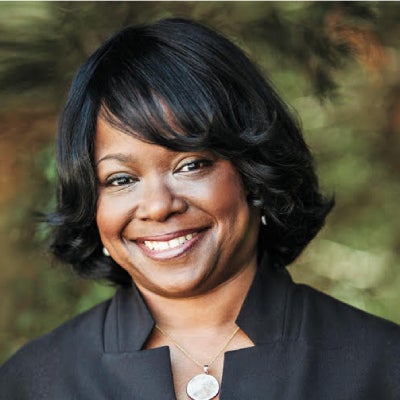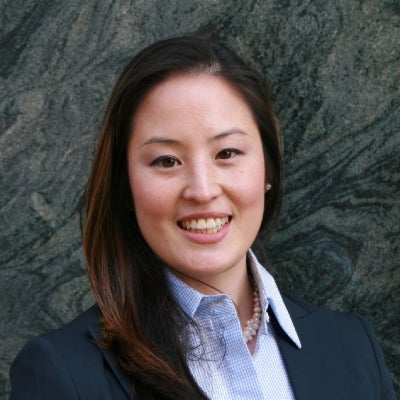At the 2021 ACC Annual Meeting, four GCs discussed how in-house counsel can move up to the C-suite in the panel “Follow the Yellow Brick Road to the GC Suite.”
The panel featured Christine Castellano, EVP, GC, and corporate secretary at The Andersons, Inc.; Gail Sharps Myers, EVP, CLO, chief people officer, and secretary at Denny’s; and Jason Duva, GC and chief administrative officer at Lathan Pool Products Inc. Hosting the panel was Amy Yeung, GC, and chief privacy officer at Lotame Solutions, Inc.




As host, Yeung encouraged the GCs to have a candid dialogue. Below are the key takeaways from the discussion.
First steps to GC
Castellano was promoted to GC in her company after she took on more projects and grew in her career. She attributes this to embracing the “never say no” approach. “If somebody asks you if you want to do a deal, you say ‘yes,’” she explains. That included international business trips when she had a small child at the time.
Taking on new responsibilities is critical to gaining experience, says Duva. He continues: “Be open to new challenges, and don’t put yourself in a box and define your role too narrowly.” He also recommends being curious and asking a lot of questions.
Sharps Myers agrees that aspiring GCs should ask questions and learn as much about the business as possible. For example, she worked in her company’s warehouse for a couple of days to truly understand the business’s operational side.
“There was no question that was asked, that wasn't something I wouldn't be willing to share my opinion on.”
– Gail Sharps Myers
Build your “fan club”
A support system is critical when advancing in your career. To gather supporters, make your intentions known, Duva recommends. Speaking with the GC about your ambitions will help when it comes time to succession planning, as they’ll know to top of their list. The GC can also give you advice on professional development and areas for you grow. “Know what you're missing, and then go out and close the gap,” he advises.
Initially, Castellano was passed over for GC, as she was missing skills needed to join the C-suite. But since she showed interest, the GC spoke to her on a business trip – even trading her first-class ticket to sit with Castellano in coach to give advice on how to become GC. She then became Castellano’s mentor to help her fill those skill gaps and build her network.
Don’t limit yourself to one mentor, Castellano advises. Be sure to find a few mentors whose expertise complement the skills you’re seeking to learn. The goal is to create a fan club – an “honest fan club,” Castellano clarifies. Ideally, these hype people should encourage you and give you professional advice, but they should also provide constructive feedback.
Your fan club needs more than mentors. Sharps Myers recommends getting sponsors inside and outside your company to help you improve your executive skills. You’ll need that help, but don’t let that intimidate you. “I promise you that first day as GC, none of us knew what we were doing. And it’s okay!” she assures the audience.
“To round out the trifecta” of your fan club, Duva recommends finding a coach who will help you make the leap from a non-executive to an executive role.
What’s in a title?
One company’s GC is another’s CLO. Then there are the roles you gain, like corporate secretary, executive vice president, or jobs that you might not expect.
Sharps Myers says that “most people will realize is that when they take a job, it might not be the job that they're actually hired to do. The one thing that we all need to do is understand that you have to be flexible, and things change. And it's okay.” Wearing many different hats is part of being the lead counsel – no matter the title.
For example, Castellano was hired to be GC, corporate secretary, and other “very traditional roles.” When the pandemic hit, she led the COVID task force, then slowly started accumulating more roles, like managing HR, corporate communications, and ESG.
Duva also agrees that it’s the opportunity, not the title that matters:
“If you have an opportunity to get that top lawyer position, regardless of what the title is… go for it.”
But before committing to an organization, make sure it’s the right place to start your GC role. Castellano advises considering the size and culture of the company. And if it’s not the right fit, don’t take the job. Instead, she says to wait for a GC opportunity at an organization where you’ll be the “most successful you possibly can be in your new role.”
Positioning yourself for success
Preparation is key to reach the C-suite, Sharps Myers says. “You need to make sure that you have properly positioned yourself to take advantage of the opportunity when it arises,” she stresses. “You can't be caught off guard by it. You just have to be ready for it.”
This goes back to your resume. When Castellano first started her career, the quality of paper was a priority for resumes; now it’s using LinkedIn “buzzwords” to your advantage.
For example, if you want to focus on maritime law, list those as your skills and interests and follow companies and groups that specialize in those fields. Likewise, Yeung reminds the audience to feature keywords in their resume to make sure it passes the filter and gets to the hiring manager.
Castellano had difficulty applying to jobs, and found better success reaching out to her connections. In fact, a recruiter later told her she had “screened her out for a particular reason,” but since she knew someone from the C-suite or board, they recommended that they interview her. Having someone vouch for you helps you stand apart from the stack of other applicants.
Never. Stop. Learning.
The learning doesn’t stop when you reach your destination as GC. “Even as a GC, you've still got gaps you need to fill,” Castellano points out. Continue taking classes and gaining new responsibilities to broaden your experience for your next project or future GC role.




